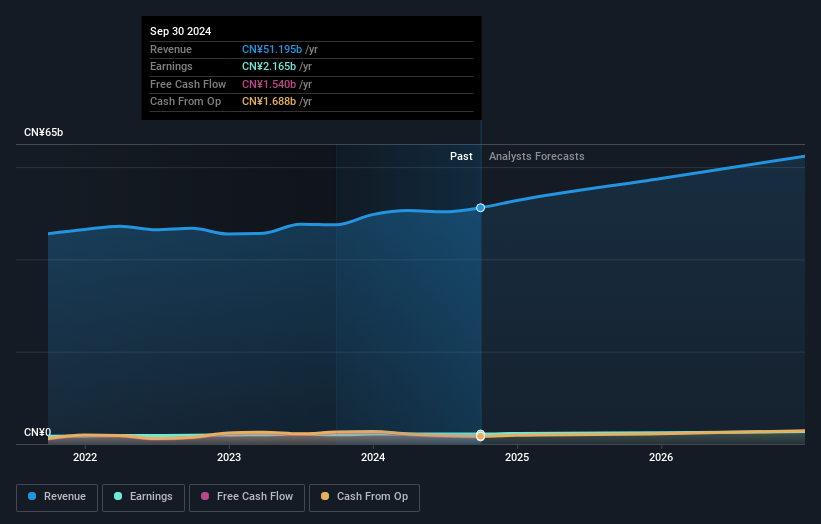- China
- /
- Healthcare Services
- /
- SHSE:600511
Private companies are China National Medicines Corporation Ltd.'s (SHSE:600511) biggest owners and were hit after market cap dropped CN¥1.0b

Key Insights
- The considerable ownership by private companies in China National Medicines indicates that they collectively have a greater say in management and business strategy
- 55% of the company is held by a single shareholder (China National Pharmaceutical Group Corporation)
- Institutions own 16% of China National Medicines
A look at the shareholders of China National Medicines Corporation Ltd. (SHSE:600511) can tell us which group is most powerful. And the group that holds the biggest piece of the pie are private companies with 56% ownership. In other words, the group stands to gain the most (or lose the most) from their investment into the company.
As market cap fell to CN¥25b last week, private companies would have faced the highest losses than any other shareholder groups of the company.
Let's delve deeper into each type of owner of China National Medicines, beginning with the chart below.
Check out our latest analysis for China National Medicines

What Does The Institutional Ownership Tell Us About China National Medicines?
Institutions typically measure themselves against a benchmark when reporting to their own investors, so they often become more enthusiastic about a stock once it's included in a major index. We would expect most companies to have some institutions on the register, especially if they are growing.
As you can see, institutional investors have a fair amount of stake in China National Medicines. This can indicate that the company has a certain degree of credibility in the investment community. However, it is best to be wary of relying on the supposed validation that comes with institutional investors. They too, get it wrong sometimes. It is not uncommon to see a big share price drop if two large institutional investors try to sell out of a stock at the same time. So it is worth checking the past earnings trajectory of China National Medicines, (below). Of course, keep in mind that there are other factors to consider, too.

China National Medicines is not owned by hedge funds. China National Pharmaceutical Group Corporation is currently the company's largest shareholder with 55% of shares outstanding. This implies that they have majority interest control of the future of the company. Meanwhile, the second and third largest shareholders, hold 5.1% and 1.9%, of the shares outstanding, respectively.
Researching institutional ownership is a good way to gauge and filter a stock's expected performance. The same can be achieved by studying analyst sentiments. Quite a few analysts cover the stock, so you could look into forecast growth quite easily.
Insider Ownership Of China National Medicines
The definition of company insiders can be subjective and does vary between jurisdictions. Our data reflects individual insiders, capturing board members at the very least. Company management run the business, but the CEO will answer to the board, even if he or she is a member of it.
I generally consider insider ownership to be a good thing. However, on some occasions it makes it more difficult for other shareholders to hold the board accountable for decisions.
We note our data does not show any board members holding shares, personally. It is unusual not to have at least some personal holdings by board members, so our data might be flawed. A good next step would be to check how much the CEO is paid.
General Public Ownership
The general public-- including retail investors -- own 27% stake in the company, and hence can't easily be ignored. This size of ownership, while considerable, may not be enough to change company policy if the decision is not in sync with other large shareholders.
Private Company Ownership
Our data indicates that Private Companies hold 56%, of the company's shares. It's hard to draw any conclusions from this fact alone, so its worth looking into who owns those private companies. Sometimes insiders or other related parties have an interest in shares in a public company through a separate private company.
Next Steps:
It's always worth thinking about the different groups who own shares in a company. But to understand China National Medicines better, we need to consider many other factors. To that end, you should be aware of the 1 warning sign we've spotted with China National Medicines .
But ultimately it is the future, not the past, that will determine how well the owners of this business will do. Therefore we think it advisable to take a look at this free report showing whether analysts are predicting a brighter future.
NB: Figures in this article are calculated using data from the last twelve months, which refer to the 12-month period ending on the last date of the month the financial statement is dated. This may not be consistent with full year annual report figures.
New: AI Stock Screener & Alerts
Our new AI Stock Screener scans the market every day to uncover opportunities.
• Dividend Powerhouses (3%+ Yield)
• Undervalued Small Caps with Insider Buying
• High growth Tech and AI Companies
Or build your own from over 50 metrics.
Have feedback on this article? Concerned about the content? Get in touch with us directly. Alternatively, email editorial-team (at) simplywallst.com.
This article by Simply Wall St is general in nature. We provide commentary based on historical data and analyst forecasts only using an unbiased methodology and our articles are not intended to be financial advice. It does not constitute a recommendation to buy or sell any stock, and does not take account of your objectives, or your financial situation. We aim to bring you long-term focused analysis driven by fundamental data. Note that our analysis may not factor in the latest price-sensitive company announcements or qualitative material. Simply Wall St has no position in any stocks mentioned.
About SHSE:600511
Flawless balance sheet established dividend payer.
Market Insights
Community Narratives




